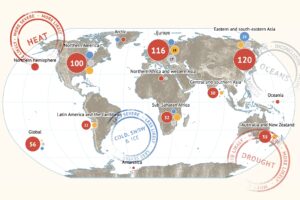Welcome to Carbon Brief’s China Briefing.
China Briefing handpicks and explains the most important climate and energy stories from China over the past fortnight.
Subscribe for free here.
Key developments
China’s role at COP29 and beyond
‘COOPERATIVE’ COP: China’s “role” at the COP29 climate talks, which concluded over the weekend in Baku, Azerbaijan, was “markedly different to previous years”, with its negotiators being “unusually cooperative”, according to an anonymous “chief negotiator” for a “powerful” country quoted by BBC News. Bloomberg cited sources “close to the Chinese delegation” explaining that “Chinese officials moved to soothe angry delegations from India, Saudi Arabia, Africa and the small island group” during the tense final plenary. It added that China’s delegation head Zhao Yingmin, who is also the vice minister of the Ministry of Ecology and Environment (MEE), held “one-on-one conversations with delegates in the final hours to warn things would be worse without COP29’s finance agreement”. COP29 president Mukhtar Babayev wrote in the Guardian that China “coordinat[ed] their response to the negotiations…with the G77 group”. Babayev also claimed that “the Chinese were willing to offer more [climate finance] if others did so too”. (For more on China’s role at COP29, see the Spotlight.)
-
Sign up to Carbon Brief’s free “China Briefing” email newsletter. All you need to know about the latest developments relating to China and climate change. Sent to your inbox every Thursday.
GLOBAL CALLS: As concerns over the US’s future role loomed over the two-week summit, UN climate chief Simon Stiell said the world “will need China’s continued leadership” to meet climate goals, Politico reported. This was echoed by South Africa’s environment minister, who said China “has an opportunity to lead the global fight against climate change”, according to Bloomberg. BBC News quoted Jonathan Pershing, program director of environment at the William and Flora Hewlett Foundation, saying that, should China become the de-facto leader at future COPs, it “won’t lead from the front, like the US and Europe”, but instead would “discreetly interven[e] to unblock disputes…behind closed doors”.
CHINA’S REACTION: In response to Stiell, Politico quoted Zhao saying: “China has contributed in addressing climate change. But, in the future, China will do our best to contribute more.” Zhao also said in an interview with business news outlet 21st Century Herald that China will be “the backbone of the global response to climate change”. Nevertheless, Chinese climate envoy Liu Zhenmin told Beijing News that “people expect China and the EU to work together to fill this gap [of US leadership], which is a very good wish, but, in practice, it is very difficult”. (Read more in the Spotlight below.) China’s foreign ministry noted that agreements at COP29 demonstrated global “willingness” to address climate change, although it added that developed countries should “effectively fulfil their obligations and responsibilities”, Shanghai-based news outlet the Paper said. A commentary in the party-affiliated People’s Daily under the nom de plume “Heyin”, which is used for articles expressing the view of party leadership on international affairs, said COP29 “consolidated the momentum” of the global energy transition, adding that “no matter how the [geopolitical] climate changes, China’s determination…to actively address climate change will remain unchanged”. Elsewhere, an editorial in the state-run newspaper China Daily argued COP29 was an “unusual climate diplomacy success” as it broke “the long-standing multilateral negotiations stalemate over climate financing”.
New China research
EARLY PEAK: Meanwhile, on the sidelines of COP29, an assessment by research institute the Centre for Research on Energy and Clean Air (CREA) of China’s energy transition in 2024 found that the clean energy industry “continued to exceed forecasts”, but that spiking energy consumption meant record additions served only to “stabilise emissions, not to push them down”. It added that 52% of experts surveyed by CREA expected China’s coal consumption to peak by 2025 and 44% believe China’s carbon emissions have already peaked or will peak by 2025.
POLLUTING PROVINCES: Al Gore-backed research institute Climate Trace released a report finding that Shanghai was the world’s “most polluting” city, Fortune said. It added that “seven states or provinces spew more than 1bn metric tonnes of greenhouse gases [per year]”, six of which are in China – the exception being Texas.
POWER SYSTEM REFORM: The International Energy Agency also presented a report at COP29 examining the “evolving flexibility requirements of China’s power system” during its energy transition, finding that “non-fossil resources, such as hydropower, battery storage and demand response, could fulfil nearly 60% of [China’s] short-term flexibility needs by 2030”, according to a press statement.
‘INSUFFICIENT’ SPEED: The 2024 Global Carbon Neutrality Progress Report, released by Beijing’s Tsinghua University, evaluated progress in 151 countries that have set carbon neutrality targets. The report said that developing countries have higher “ambitions” and willingness to reduce emissions than developed countries. However, it added that the “current speed of renewable energy development globally is insufficient” to meet the target of tripling renewable energy capacity by 2030 – a goal set at COP28 in an effort to limit global warming to 1.5C.
Xi at APEC and G20
SUNNIER CLIMES: As his subordinates hashed out details in Baku, President Xi Jinping’s attendance of the APEC economic leaders’ meeting in Peru and G20 summit in Brazil “fuelled expectations that China will continue championing…better global governance”, China Daily said, adding that during APEC Xi “emphasised the importance of innovation, openness, green development and inclusive growth”. Xi also inaugurated Peru’s Chancay port – built by a Chinese company – as Beijing “look[s] to further tap into resource-rich Latin America”, Reuters reported. At the G20 summit, Xi noted the importance of supporting developing countries in “responding to…climate change, biodiversity loss and environmental pollution”, state news agency Xinhua said. China also signed 37 agreements with Brazil, according to the Associated Press, which included specific agreements on mining, solar and nuclear power.
UK-CHINA TIES: In the first high-level meeting between the UK and China since 2018, UK prime minister Keir Starmer told Xi that the UK “would like to engage with Beijing on areas such as trade, the economy and climate”, Reuters reported. Starmer told the UK House of Commons that the two countries need to “work together on challenges such as climate change and delivering growth”, adding that he and Xi “agreed a new dialogue on these issues, which [UK chancellor Rachel Reeves] will take forward with vice premier He [Lifeng] in Beijing” next year, according to a transcript of his remarks.
‘Disorderly expansion’ of solar factories targeted
RAISING REQUIREMENTS: China’s Ministry of Industry and Information Technology (MIIT) raised minimum capital requirements for construction and expansion of solar-manufacturing projects, the Hong Kong-based South China Morning Post said, adding that MIIT also urged manufacturers to limit projects that are “merely meant to increase capacity”. Lin Boqiang, director of Xiamen University’s China Energy Policy Research Institute, told business news outlet Yicai the move will “control the disorderly expansion of production capacity”.
LOWERING REBATES: China’s finance and tax bodies also “announced a reduction in the export tax rebate” for solar products, “squeezing profit margins” and possibly leading to companies “increasing export prices”, PV Magazine reported, in what may be “part of a longer-term strategy”. Finance news outlet Wall Street CN noted that rebates for batteries will also shrink, but that manufacturers will still have a “price advantage in overseas markets”.
EXPERT VIEWS: Liu Shijin, former vice-president of the Development Research Centre (DRC) and chief advisor at the China Council for International Cooperation on Environment and Development (CCICED), said in a speech covered by Yicai that “overcapacity” is a “normal process of market competition”, adding that the government should avoid “disturbing” industries through “administrative intervention and unfair competition”, and instead encourage market expansion by “accelerating the shift from dual-control of energy consumption to dual-control of carbon emissions”.
Spotlight
COP29: How China approached the UN climate talks in Baku
As ever at COPs, a key question was how the world’s current largest annual emitter, China, would approach the talks. This year, with Donald Trump being reelected as the US president, more expectations fell on China to step up and do more.
In this article, Carbon Brief summaries some of the key points China made at COP29. This is a summary of “China at COP29” in Carbon Brief’s in-depth summary of the event’s key outcomes.
China arrived at the COP29 UN climate talks in Baku with the fifth-largest delegation, continuing its recent trend of major showings at the annual summit.
At the high-level opening of the talks, China’s vice premier Ding Xuexiang – who is president Xi Jinping’s “special representative” at COP – declared that his country had “provided and mobilised project funds of more than 177bn yuan ($24.5bn) for developing countries’ climate response” since 2016.
This was the first time China used the language of climate finance to talk about its overseas aid. It quickly drew attention to Beijing’s intentions and levels of ambition for climate finance.
Kate Logan, director of the China climate hub at the Asia Society Policy Institute (ASPI), wrote on Twitter that this placed China “on the same order – if not higher than – many developed countries’ efforts” on climate finance.
Dialogue Earth reported that Beijing has contributed more than $30bn to global climate finance since the launch of its “Belt and Road Initiative”, putting China “on a par with the UK, to become the joint fifth-largest provider of climate finance after Japan, Germany, the US and France”.
However, entering week two, China’s stance on climate finance remained firm – it said it would not agree to make any compulsory contributions, including to the new climate finance goal (NCQG) that was being negotiated at the summit.
China’s new climate envoy Liu Zhenmin, replacing Xie Zhenhua, told the Paper, a Shanghai-based outlet, that paying for the NCQG was “their business”, referring to developed countries.
During the closing stages of COP29, Xia Yingxian, director of the department of climate change of the Ministry of Environment and Ecology, said that a serious climate finance offer from developed countries was the “master switch and golden key” to a deal in Baku.
Liu was also quoted by state-run newspaper China Daily, saying China is “not obliged to contribute to the post-2025 climate financing target that is expected to be announced during COP29”.
At the closing plenary, Carbon Brief heard Zhao Yingmin, head of Chinese delegation and the vice minister of the Ministry of Ecology and Environment (MEE), saying that developed countries’ NCQG commitments were still “fall far short of meeting the needs of developing nations” and that developed countries’ “financial obligations must be further clarified”.
Nevertheless, China said it remained open to multilateral cooperation on climate change.
Chen Zhihua, deputy director of China’s National Centre for Climate Strategy and International Cooperation, told Carbon Brief that Donald Trump being reelected as the US president “certainly is a big thing that people talk about and [we] have concerns about how things will turn out”.
He added: “It will have big impacts, but China won’t change its strategy – we will cooperate with whoever for global cooperation on climate change.”
Wen Hua, deputy director-general of the Department of Resources Conservation and Environmental Protection at China’s top planner the National Development and Reform Commission (NDRC), said at another event attended by Carbon Brief: “China is willing to take a more active role in global climate governance.”
Throughout COP29, China strongly identified itself as a developing country. China, together with the G77 group of developing counties, rejected an initial draft for the NCQG framework. According to BBC News, they wanted “public grants of $500bn per year”.
At the South-South Cooperation on Climate Change forum hosted by China, Carbon Brief heard Huang Runqiu, minister of the MEE, saying that the world needs multilateral cooperation on combating climate change, but that “green trade barriers” prevent better cooperation, especially for developing countries.
Wang Can, director of the department of environmental planning and management at Beijing’s Tsinghua University, explained to Carbon Brief that the “green trade barriers” are “bans and tariffs…mainly from the US” on renewable technology products.
Both Chinese academics and multiple senior officials expressed their desire for international cooperation on energy transition at COP29.
For example, Wen called the energy transition “fundamental” for China at an event hosted by the country’s COP29 pavilion.
China also stated some of its specific targets and actions for addressing climate change, such as the latest emissions standards for coalbed methane introduced by Liu at a methane summit held during COP29.
Regarding China’s next NDC, an anonymous scholar told Carbon Brief that shifts in the new pledge could lie in “adjusting the timeline of [the] ‘dual-carbon’ goal”, which currently targets a peak in emissions “before 2030” and carbon neutrality “by 2060”. (For more views, see Carbon Brief’s “Experts: What to expect in China’s climate pledge for 2035.”)
China has already adjusted its “dual-carbon” goal from “achieving carbon peak by 2030” to “before 2030”. Bai Quan, director of the Energy Research Institute of the Academy of Macroeconomic Research (AMR), a government-affiliated “national high-end thinktank”, told Carbon Brief that while “we would love to try our best…we can’t rule out all possibilities to peak even earlier than planned”.
(Read Carbon Brief’s full-length interview with Bai and his colleague Lyu Wenbin.)
Captured

China’s historical carbon dioxide (CO2) emissions within its borders are now higher than the 27 member states of the EU combined, new Carbon Brief analysis found, although it is “still far behind” and “unlikely to ever overtake” the US total. The analysis – which was covered by the New York Times under the headline: “China’s soaring emissions are upending climate politics” – noted that when viewed on a per-capita basis, using 2024 figures, China’s contribution is “just 227tCO2 per capita, less than a third of the 682tCO2 for people in the EU27”.
Watch, read, listen
PROGRESS UPDATE: China Water Risk published an analysis of China’s progress towards its carbon targets and its “potential” to accelerate its shift away from coal.
MINERAL TRANSITION: The China-Global South Podcast, aired by the Sinic Podcast Network, discussed “Indonesia’s uncomfortable position squeezed between China and the US in the race to dominate transition mineral supply chains”.
KEYNOTE: The South China Morning Post interviewed Ma Jun, founder of the Beijing-based Institute of Public and Environmental Affairs (IPE), on prospects for future US-China climate diplomacy and China’s path to carbon neutrality.
MEXICAN STANDOFF: The electric vehicle-focused newsletter Dunne Insights assessed why Chinese car exports to Mexico have spiked in recent months, and how it might be “pressured” by the US and Canada to respond.
88
The number of extreme weather events in China that had their “severity or likelihood” increased by climate change, out of a total of 114 attribution studies covering the country, according to Carbon Brief analysis. The figures come from Carbon Brief’s updated “attribution map”, which covers every attribution study published since the method was developed in 2004. The map includes more than 600 studies, with China making up 16%. More than 70% of the China-focused studies were published in the past four years, significantly higher than average.
New science
npj Climate and Atmospheric Science
The number of heat-related diabetes deaths in Chinese cities is expected to increase by the end of the century as a result of global warming, a new study warned. The authors predicted deaths due to extreme heat over 2010-2100 in 32 “major” Chinese cities. They projected that under the low warming SSP1-2.6 scenario, the heat-attributable fraction of diabetes deaths will rise from 2.3% in the 2010s to 4.6% in the 2090s. Under the high warming SSP5-8.5 scenario, the fraction could rise to 19.2% in the 2090s, they added.
Communications Earth & Environment
Electric vehicles in China have nearly a 12% reduction in CO2 as compared to internal combustion engines, according to new research. Researchers carried out a life-cycle analysis of internal combustion engines, plug-in hybrid vehicles and battery EVs in each of China’s provinces. They found that while battery EVs reduced CO2 and nitrogen oxide emissions, they had higher emissions of sulphur dioxide and particulate matter. The authors wrote that “improving technological progress and optimising electricity mix will greatly assist in achieving emissions reduction”.
China Briefing is compiled by Wanyuan Song and Anika Patel. It is edited by Wanyuan Song and Dr Simon Evans. Please send tips and feedback to china@carbonbrief.org
The post China Briefing 28 November 2024: How China approached COP29; Xi cuts energy deals in South America; Solar’s ‘disorderly’ expansion appeared first on Carbon Brief.
Greenhouse Gases
DeBriefed 27 February 2026: Trump’s fossil-fuel talk | Modi-Lula rare-earth pact | Is there a UK ‘greenlash’?
Welcome to Carbon Brief’s DeBriefed.
An essential guide to the week’s key developments relating to climate change.
This week
Absolute State of the Union
‘DRILL, BABY’: US president Donald Trump “doubled down on his ‘drill, baby, drill’ agenda” in his State of the Union (SOTU) address, said the Los Angeles Times. He “tout[ed] his support of the fossil-fuel industry and renew[ed] his focus on electricity affordability”, reported the Financial Times. Trump also attacked the “green new scam”, noted Carbon Brief’s SOTU tracker.
COAL REPRIEVE: Earlier in the week, the Trump administration had watered down limits on mercury pollution from coal-fired power plants, reported the Financial Times. It remains “unclear” if this will be enough to prevent the decline of coal power, said Bloomberg, in the face of lower-cost gas and renewables. Reuters noted that US coal plants are “ageing”.
OIL STAY: The US Supreme Court agreed to hear arguments brought by the oil industry in a “major lawsuit”, reported the New York Times. The newspaper said the firms are attempting to head off dozens of other lawsuits at state level, relating to their role in global warming.
SHIP-SHILLING: The Trump administration is working to “kill” a global carbon levy on shipping “permanently”, reported Politico, after succeeding in delaying the measure late last year. The Guardian said US “bullying” could be “paying off”, after Panama signalled it was reversing its support for the levy in a proposal submitted to the UN shipping body.
Around the world
- RARE EARTHS: The governments of Brazil and India signed a deal on rare earths, said the Times of India, as well as agreeing to collaborate on renewable energy.
- HEAT ROLLBACK: German homes will be allowed to continue installing gas and oil heating, under watered-down government plans covered by Clean Energy Wire.
- BRAZIL FLOODS: At least 53 people died in floods in the state of Minas Gerais, after some areas saw 170mm of rain in a few hours, reported CNN Brasil.
- ITALY’S ATTACK: Italy is calling for the EU to “suspend” its emissions trading system (ETS) ahead of a review later this year, said Politico.
- COOKSTOVE CREDITS: The first-ever carbon credits under the Paris Agreement have been issued to a cookstove project in Myanmar, said Climate Home News.
- SAUDI SOLAR: Turkey has signed a “major” solar deal that will see Saudi firm ACWA building 2 gigawatts in the country, according to Agence France-Presse.
$467 billion
The profits made by five major oil firms since prices spiked following Russia’s invasion of Ukraine four years ago, according to a report by Global Witness covered by BusinessGreen.
Latest climate research
- Claims about the “fingerprint” of human-caused climate change, made in a recent US Department of Energy report, are “factually incorrect” | AGU Advances
- Large lakes in the Congo Basin are releasing carbon dioxide into the atmosphere from “immense ancient stores” | Nature Geoscience
- Shared Socioeconomic Pathways – scenarios used regularly in climate modelling – underrepresent “narratives explicitly centring on democratic principles such as participation, accountability and justice” | npj Climate Action
(For more, see Carbon Brief’s in-depth daily summaries of the top climate news stories on Monday, Tuesday, Wednesday, Thursday and Friday.)
Captured
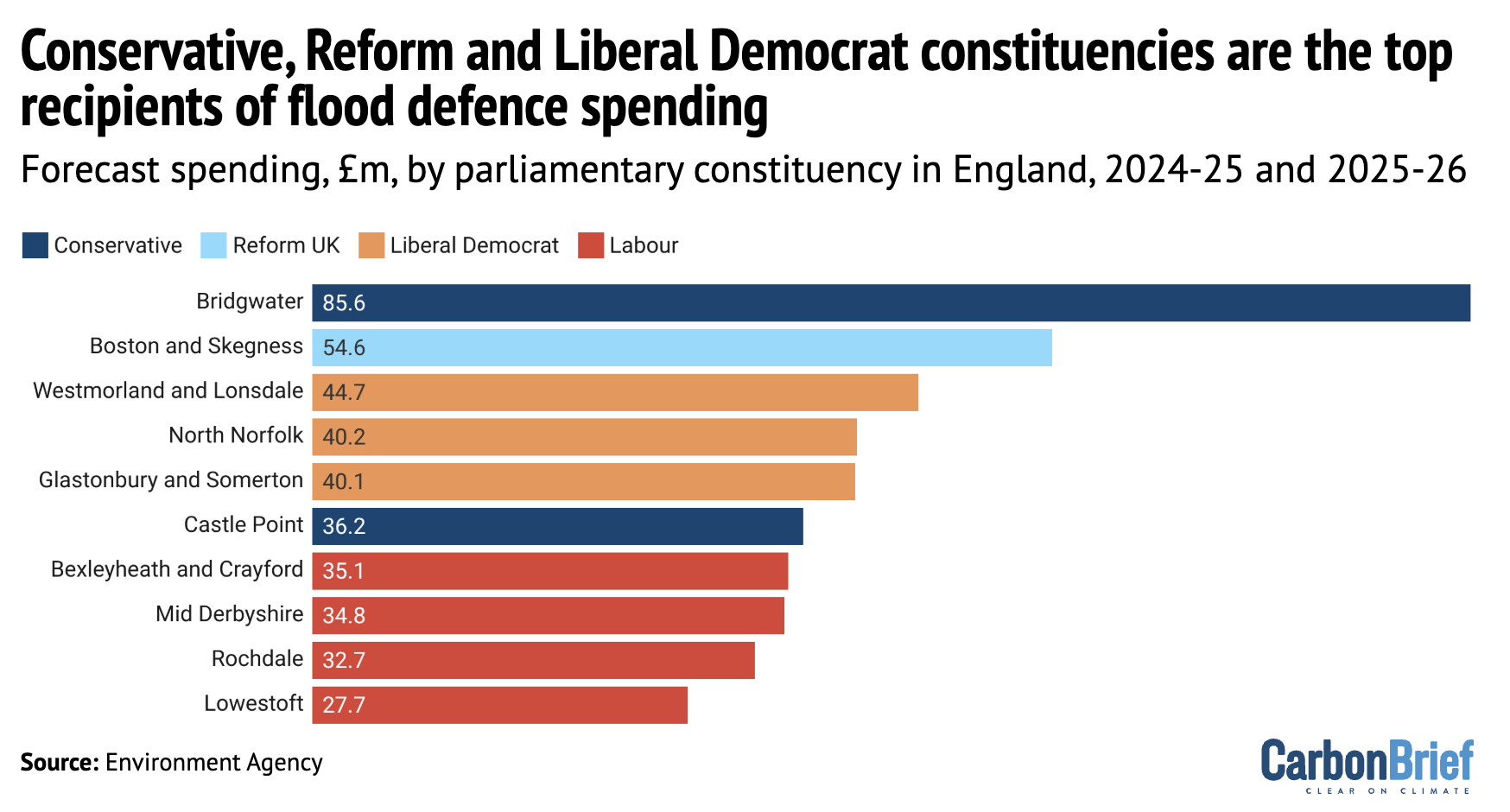
The constituency of Richard Tice MP, the climate-sceptic deputy leader of Reform UK, is the second-largest recipient of flood defence spending in England, according to new Carbon Brief analysis. Overall, the funding is disproportionately targeted at coastal and urban areas, many of which have Conservative or Liberal Democrat MPs.
Spotlight
Is there really a UK ‘greenlash’?
This week, after a historic Green Party byelection win, Carbon Brief looks at whether there really is a “greenlash” against climate policy in the UK.
Over the past year, the UK’s political consensus on climate change has been shattered.
Yet despite a sharp turn against climate action among right-wing politicians and right-leaning media outlets, UK public support for climate action remains strong.
Prof Federica Genovese, who studies climate politics at the University of Oxford, told Carbon Brief:
“The current ‘war’ on green policy is mostly driven by media and political elites, not by the public.”
Indeed, there is still a greater than two-to-one majority among the UK public in favour of the country’s legally binding target to reach net-zero emissions by 2050, as shown below.
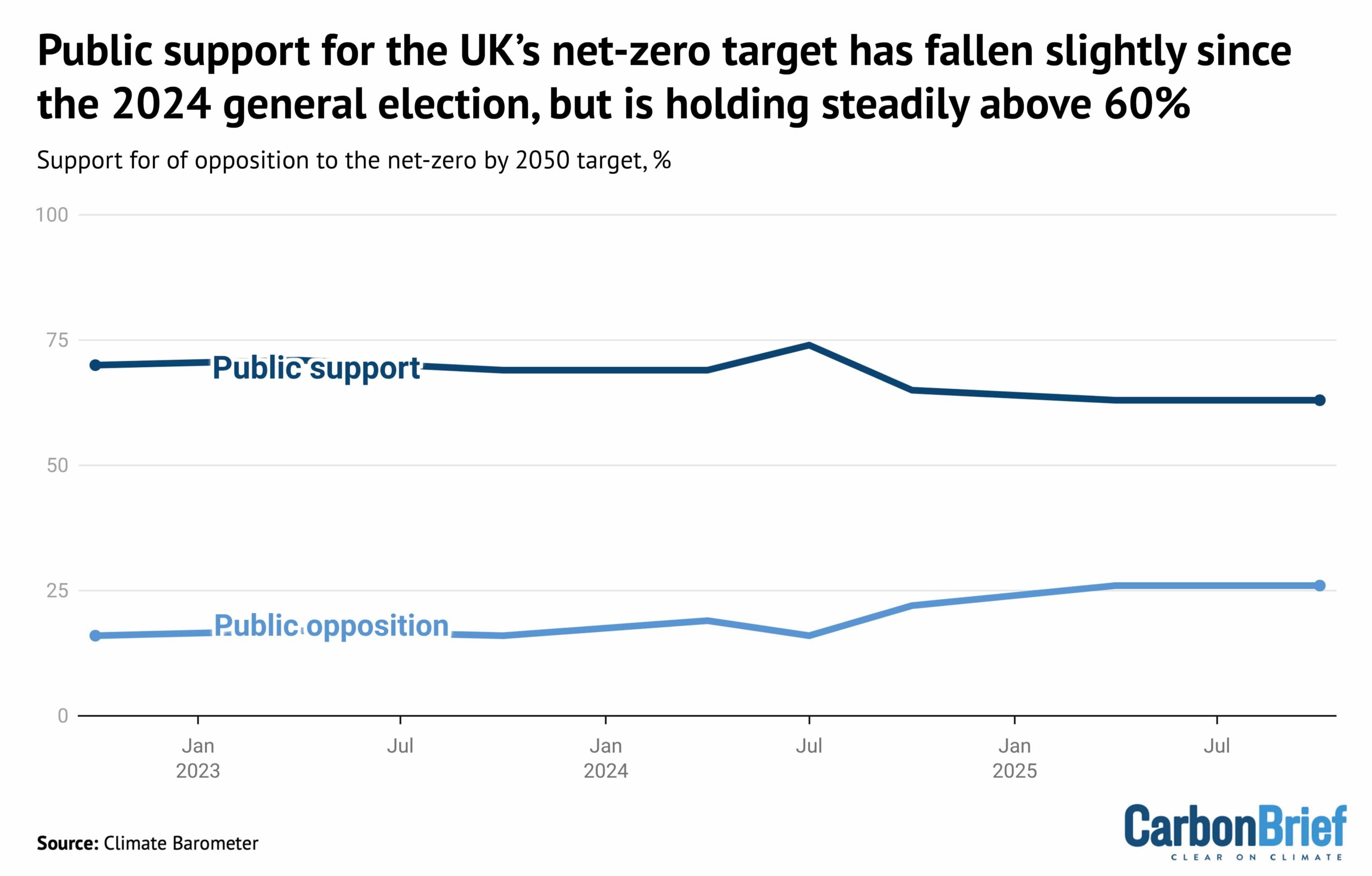
Steve Akehurst, director of public-opinion research initiative Persuasion UK, also noted the growing divide between the public and “elites”. He told Carbon Brief:
“The biggest movement is, without doubt, in media and elite opinion. There is a bit more polarisation and opposition [to climate action] among voters, but it’s typically no more than 20-25% and mostly confined within core Reform voters.”
Conservative gear shift
For decades, the UK had enjoyed strong, cross-party political support for climate action.
Lord Deben, the Conservative peer and former chair of the Climate Change Committee, told Carbon Brief that the UK’s landmark 2008 Climate Change Act had been born of this cross-party consensus, saying “all parties supported it”.
Since their landslide loss at the 2024 election, however, the Conservatives have turned against the UK’s target of net-zero emissions by 2050, which they legislated for in 2019.
Curiously, while opposition to net-zero has surged among Conservative MPs, there is majority support for the target among those that plan to vote for the party, as shown below.
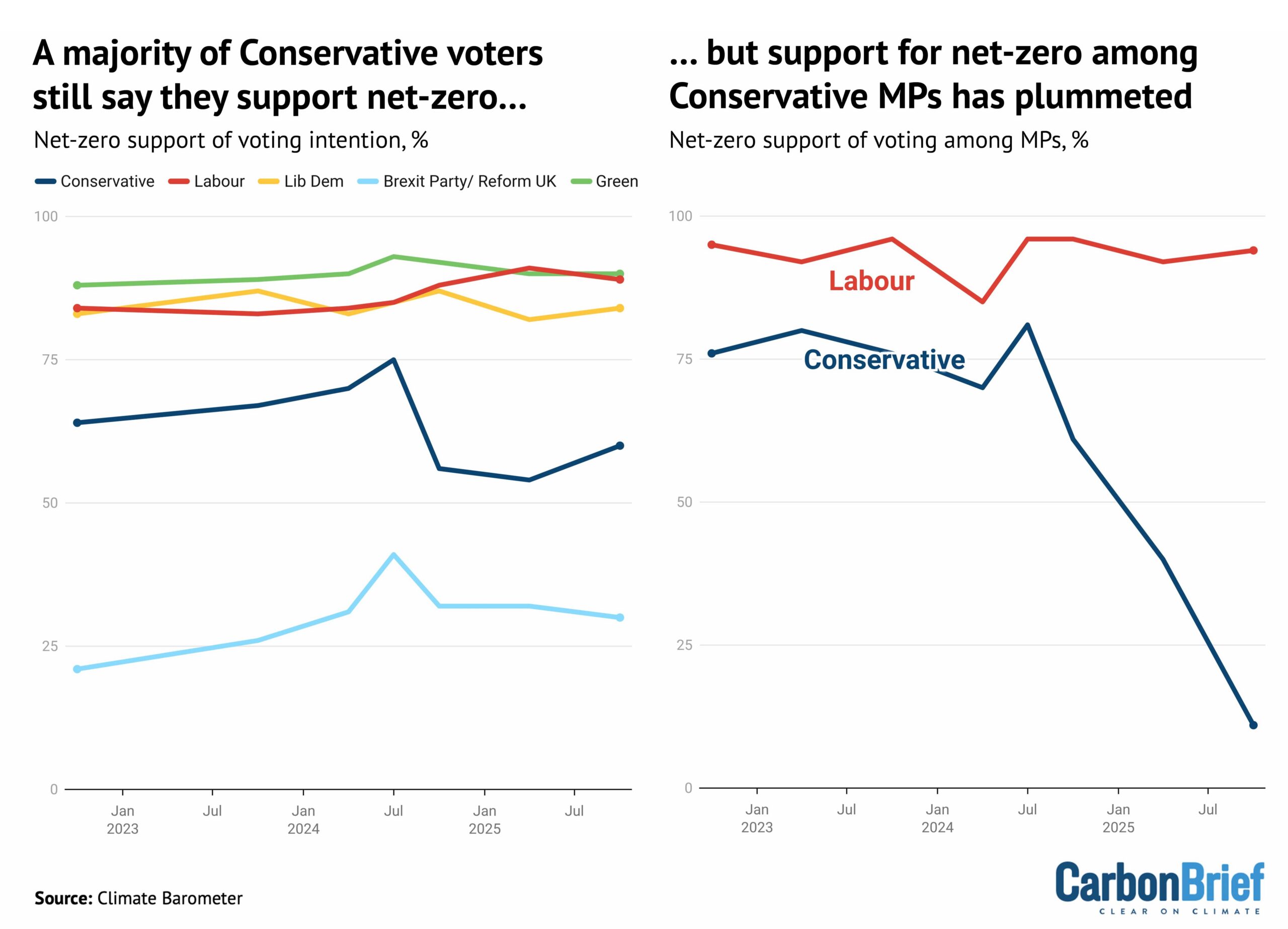
Dr Adam Corner, advisor to the Climate Barometer initiative that tracks public opinion on climate change, told Carbon Brief that those who currently plan to vote Reform are the only segment who “tend to be more opposed to net-zero goals”. He said:
“Despite the rise in hostile media coverage and the collapse of the political consensus, we find that public support for the net-zero by 2050 target is plateauing – not plummeting.”
Reform, which rejects the scientific evidence on global warming and campaigns against net-zero, has been leading the polls for a year. (However, it was comfortably beaten by the Greens in yesterday’s Gorton and Denton byelection.)
Corner acknowledged that “some of the anti-net zero noise…[is] showing up in our data”, adding:
“We see rising concerns about the near-term costs of policies and an uptick in people [falsely] attributing high energy bills to climate initiatives.”
But Akehurst said that, rather than a big fall in public support, there had been a drop in the “salience” of climate action:
“So many other issues [are] competing for their attention.”
UK newspapers published more editorials opposing climate action than supporting it for the first time on record in 2025, according to Carbon Brief analysis.
Global ‘greenlash’?
All of this sits against a challenging global backdrop, in which US president Donald Trump has been repeating climate-sceptic talking points and rolling back related policy.
At the same time, prominent figures have been calling for a change in climate strategy, sold variously as a “reset”, a “pivot”, as “realism”, or as “pragmatism”.
Genovese said that “far-right leaders have succeeded in the past 10 years in capturing net-zero as a poster child of things they are ‘fighting against’”.
She added that “much of this is fodder for conservative media and this whole ecosystem is essentially driving what we call the ‘greenlash’”.
Corner said the “disconnect” between elite views and the wider public “can create problems” – for example, “MPs consistently underestimate support for renewables”. He added:
“There is clearly a risk that the public starts to disengage too, if not enough positive voices are countering the negative ones.”
Watch, read, listen
TRUMP’S ‘PETROSTATE’: The US is becoming a “petrostate” that will be “sicker and poorer”, wrote Financial Times associate editor Rana Forohaar.
RHETORIC VS REALITY: Despite a “political mood [that] has darkened”, there is “more green stuff being installed than ever”, said New York Times columnist David Wallace-Wells.
CHINA’S ‘REVOLUTION’: The BBC’s Climate Question podcast reported from China on the “green energy revolution” taking place in the country.
Coming up
- 2-6 March: UN Food and Agriculture Organization regional conference for Latin America and Caribbean, Brasília
- 3 March: UK spring statement
- 4-11 March: China’s “two sessions”
- 5 March: Nepal elections
Pick of the jobs
- The Guardian, senior reporter, climate justice | Salary: $123,000-$135,000. Location: New York or Washington DC
- China-Global South Project, non-resident fellow, climate change | Salary: Up to $1,000 a month. Location: Remote
- University of East Anglia, PhD in mobilising community-based climate action through co-designed sports and wellbeing interventions | Salary: Stipend (unknown amount). Location: Norwich, UK
- TABLE and the University of São Paulo, Brazil, postdoctoral researcher in food system narratives | Salary: Unknown. Location: Pirassununga, Brazil
DeBriefed is edited by Daisy Dunne. Please send any tips or feedback to debriefed@carbonbrief.org.
This is an online version of Carbon Brief’s weekly DeBriefed email newsletter. Subscribe for free here.
The post DeBriefed 27 February 2026: Trump’s fossil-fuel talk | Modi-Lula rare-earth pact | Is there a UK ‘greenlash’? appeared first on Carbon Brief.
Greenhouse Gases
Analysis: Constituency of Reform’s climate-sceptic Richard Tice gets £55m flood funding
The Lincolnshire constituency held by Richard Tice, the climate-sceptic deputy leader of the hard-right Reform party, has been pledged at least £55m in government funding for flood defences since 2024.
This investment in Boston and Skegness is the second-largest sum for a single constituency from a £1.4bn flood-defence fund for England, Carbon Brief analysis shows.
Flooding is becoming more likely and more extreme in the UK due to climate change.
Yet, for years, governments have failed to spend enough on flood defences to protect people, properties and infrastructure.
The £1.4bn fund is part of the current Labour government’s wider pledge to invest a “record” £7.9bn over a decade on protecting hundreds of thousands of homes and businesses from flooding.
As MP for one of England’s most flood-prone regions, Tice has called for more investment in flood defences, stating that “we cannot afford to ‘surrender the fens’ to the sea”.
He is also one of Reform’s most vocal opponents of climate action and what he calls “net stupid zero”. He denies the scientific consensus on climate change and has claimed, falsely and without evidence, that scientists are “lying”.
Flood defences
Last year, the government said it would invest £2.65bn on flood and coastal erosion risk management (FCERM) schemes in England between April 2024 and March 2026.
This money was intended to protect 66,500 properties from flooding. It is part of a decade-long Labour government plan to spend more than £7.9bn on flood defences.
There has been a consistent shortfall in maintaining England’s flood defences, with the Environment Agency expecting to protect fewer properties by 2027 than it had initially planned.
The Climate Change Committee (CCC) has attributed this to rising costs, backlogs from previous governments and a lack of capacity. It also points to the strain from “more frequent and severe” weather events, such as storms in recent years that have been amplified by climate change.
However, the CCC also said last year that, if the 2024-26 spending programme is delivered, it would be “slightly closer to the track” of the Environment Agency targets out to 2027.
The government has released constituency-level data on which schemes in England it plans to fund, covering £1.4bn of the 2024-26 investment. The other half of the FCERM spending covers additional measures, from repairing existing defences to advising local authorities.
The map below shows the distribution of spending on FCERM schemes in England over the past two years, highlighting the constituency of Richard Tice.
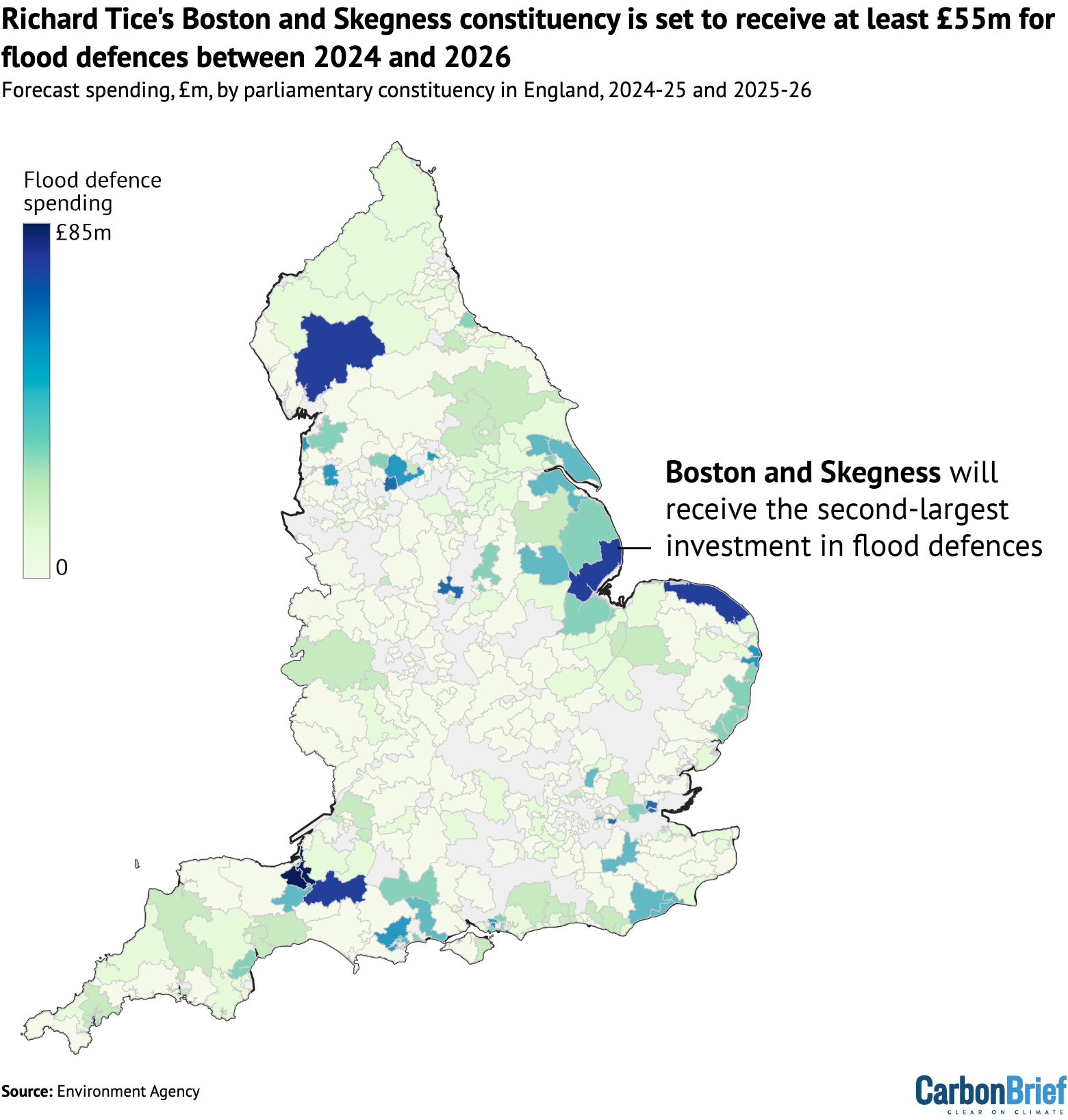
By far the largest sum of money – £85.6m in total – has been committed to a tidal barrier and various other defences in the Somerset constituency of Bridgwater, the seat of Conservative MP Ashley Fox.
Over the first months of 2026, the south-west region has faced significant flooding and Fox has called for more support from the government, citing “climate patterns shifting and rainfall intensifying”.
He has also backed his party’s position that “the 2050 net-zero target is impossible” and called for more fossil-fuel extraction in the North Sea.
Tice’s east-coast constituency of Boston and Skegness, which is highly vulnerable to flooding from both rivers and the sea, is set to receive £55m. Among the supported projects are beach defences from Saltfleet to Gibraltar Point and upgrades to pumping stations.
Overall, Boston and Skegness has the second-largest portion of flood-defence funding, as the chart below shows. Constituencies with Conservative and Liberal Democrat MPs occupied the other top positions.
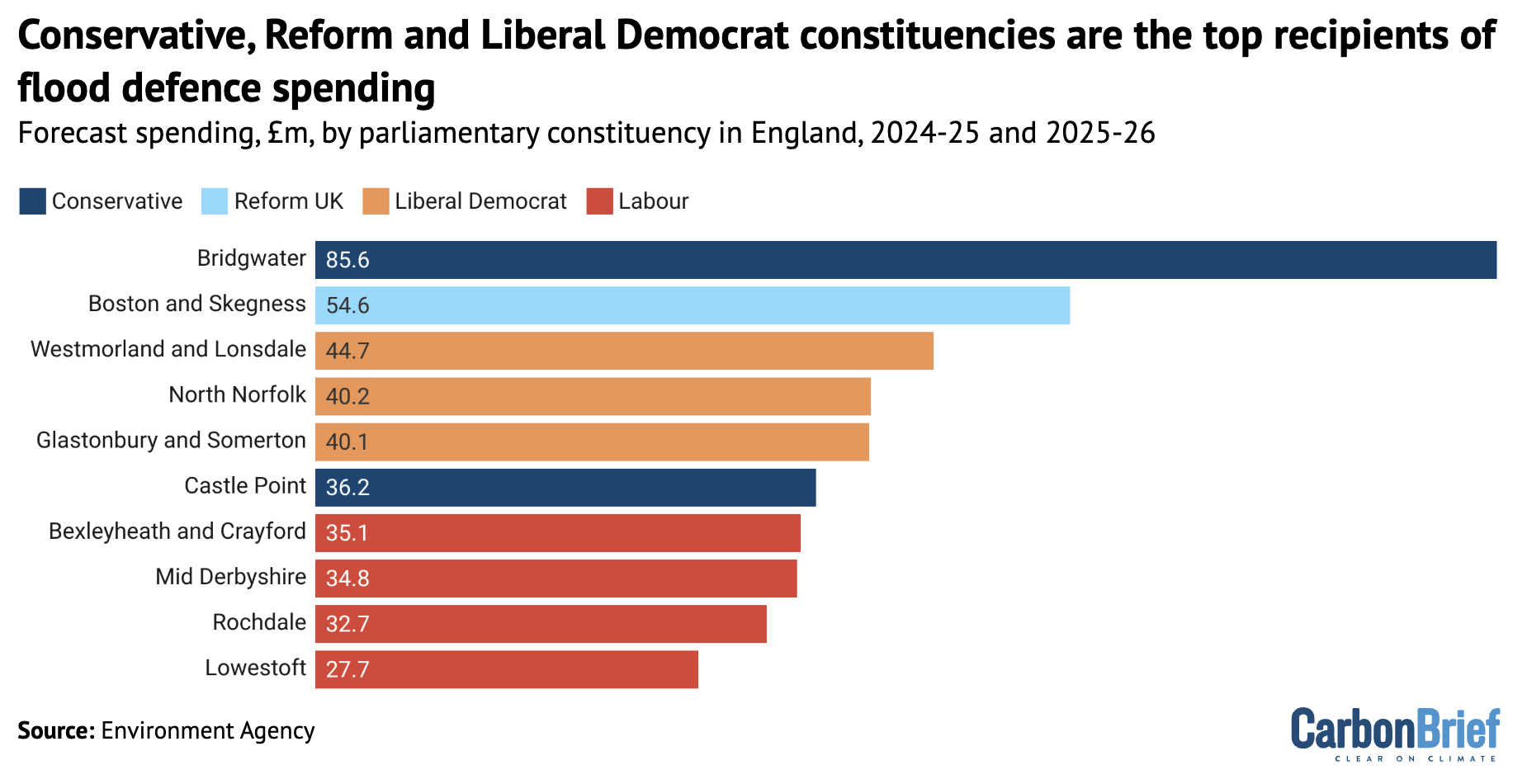
Overall, despite Labour MPs occupying 347 out of England’s 543 constituencies – nearly two-thirds of the total – more than half of the flood-defence funding was distributed to constituencies with non-Labour MPs. This reflects the flood risk in coastal and rural areas that are not traditional Labour strongholds.
Reform funding
While Reform has just eight MPs, representing 1% of the population, its constituencies have been assigned 4% of the flood-defence funding for England.
Nearly all of this money was for Tice’s constituency, although party leader Nigel Farage’s coastal Clacton seat in Kent received £2m.
Reform UK is committed to “scrapping net-zero” and its leadership has expressed firmly climate-sceptic views.
Much has been made of the disconnect between the party’s climate policies and the threat climate change poses to its voters. Various analyses have shown the flood risk in Reform-dominated areas, particularly Lincolnshire.
Tice has rejected climate science, advocated for fossil-fuel production and criticised Environment Agency flood-defence activities. Yet, he has also called for more investment in flood defences, stating that “we cannot afford to ‘surrender the fens’ to the sea”.
This may reflect Tice’s broader approach to climate change. In a 2024 interview with LBC, he said:
“Where you’ve got concerns about sea level defences and sea level rise, guess what? A bit of steel, a bit of cement, some aggregate…and you build some concrete sea level defences. That’s how you deal with rising sea levels.”
While climate adaptation is viewed as vital in a warming world, there are limits on how much societies can adapt and adaptation costs will continue to increase as emissions rise.
The post Analysis: Constituency of Reform’s climate-sceptic Richard Tice gets £55m flood funding appeared first on Carbon Brief.
Analysis: Constituency of Reform’s climate-sceptic Richard Tice gets £55m flood funding
Greenhouse Gases
Cropped 25 February 2026: Food inflation strikes | El Niño looms | Biodiversity talks stagnate
We handpick and explain the most important stories at the intersection of climate, land, food and nature over the past fortnight.
This is an online version of Carbon Brief’s fortnightly Cropped email newsletter.
Subscribe for free here.
Key developments
Food inflation on the rise
DELUGE STRIKES FOOD: Extreme rainfall and flooding across the Mediterranean and north Africa has “battered the winter growing regions that feed Europe…threatening food price rises”, reported the Financial Times. Western France has “endured more than 36 days of continuous rain”, while farmers’ associations in Spain’s Andalusia estimate that “20% of all production has been lost”, it added. Policy expert David Barmes told the paper that the “latest storms were part of a wider pattern of climate shocks feeding into food price inflation”.
-
Sign up to Carbon Brief’s free “Cropped” email newsletter. A fortnightly digest of food, land and nature news and views. Sent to your inbox every other Wednesday.
NO BEEF: The UK’s beef farmers, meanwhile, “face a double blow” from climate change as “relentless rain forces them to keep cows indoors”, while last summer’s drought hit hay supplies, said another Financial Times article. At the same time, indoor growers in south England described a 60% increase in electricity standing charges as a “ticking timebomb” that could “force them to raise their prices or stop production, which will further fuel food price inflation”, wrote the Guardian.
‘TINDERBOX’ AND TARIFFS: A study, covered by the Guardian, warned that major extreme weather and other “shocks” could “spark social unrest and even food riots in the UK”. Experts cited “chronic” vulnerabilities, including climate change, low incomes, poor farming policy and “fragile” supply chains that have made the UK’s food system a “tinderbox”. A New York Times explainer noted that while trade could once guard against food supply shocks, barriers such as tariffs and export controls – which are being “increasingly” used by politicians – “can shut off that safety valve”.
El Niño looms
NEW ENSO INDEX: Researchers have developed a new index for calculating El Niño, the large-scale climate pattern that influences global weather and causes “billions in damages by bringing floods to some regions and drought to others”, reported CNN. It added that climate change is making it more difficult for scientists to observe El Niño patterns by warming up the entire ocean. The outlet said that with the new metric, “scientists can now see it earlier and our long-range weather forecasts will be improved for it.”
WARMING WARNING: Meanwhile, the US Climate Prediction Center announced that there is a 60% chance of the current La Niña conditions shifting towards a neutral state over the next few months, with an El Niño likely to follow in late spring, according to Reuters. The Vibes, a Malaysian news outlet, quoted a climate scientist saying: “If the El Niño does materialise, it could possibly push 2026 or 2027 as the warmest year on record, replacing 2024.”
CROP IMPACTS: Reuters noted that neutral conditions lead to “more stable weather and potentially better crop yields”. However, the newswire added, an El Niño state would mean “worsening drought conditions and issues for the next growing season” to Australia. El Niño also “typically brings a poor south-west monsoon to India, including droughts”, reported the Hindu’s Business Line. A 2024 guest post for Carbon Brief explained that El Niño is linked to crop failure in south-eastern Africa and south-east Asia.
News and views
- DAM-AG-ES: Several South Korean farmers filed a lawsuit against the country’s state-owned utility company, “seek[ing] financial compensation for climate-related agricultural damages”, reported United Press International. Meanwhile, a national climate change assessment for the Philippines found that the country “lost up to $219bn in agricultural damages from typhoons, floods and droughts” over 2000-10, according to Eco-Business.
- SCORCHED GRASS: South Africa’s Western Cape province is experiencing “one of the worst droughts in living memory”, which is “scorching grass and killing livestock”, said Reuters. The newswire wrote: “In 2015, a drought almost dried up the taps in the city; farmers say this one has been even more brutal than a decade ago.”
- NOUVELLE VEG: New guidelines published under France’s national food, nutrition and climate strategy “urged” citizens to “limit” their meat consumption, reported Euronews. The delayed strategy comes a month after the US government “upended decades of recommendations by touting consumption of red meat and full-fat dairy”, it noted.
- COURTING DISASTER: India’s top green court accepted the findings of a committee that “found no flaws” in greenlighting the Great Nicobar project that “will lead to the felling of a million trees” and translocating corals, reported Mongabay. The court found “no good ground to interfere”, despite “threats to a globally unique biodiversity hotspot” and Indigenous tribes at risk of displacement by the project, wrote Frontline.
- FISH FALLING: A new study found that fish biomass is “falling by 7.2% from as little as 0.1C of warming per decade”, noted the Guardian. While experts also pointed to the role of overfishing in marine life loss, marine ecologist and study lead author Dr Shahar Chaikin told the outlet: “Our research proves exactly what that biological cost [of warming] looks like underwater.”
- TOO HOT FOR COFFEE: According to new analysis by Climate Central, countries where coffee beans are grown “are becoming too hot to cultivate them”, reported the Guardian. The world’s top five coffee-growing countries faced “57 additional days of coffee-harming heat” annually because of climate change, it added.
Spotlight
Nature talks inch forward
This week, Carbon Brief covers the latest round of negotiations under the UN Convention on Biological Diversity (CBD), which occurred in Rome over 16-19 February.
The penultimate set of biodiversity negotiations before October’s Conference of the Parties ended in Rome last week, leaving plenty of unfinished business.
The CBD’s subsidiary body on implementation (SBI) met in the Italian capital for four days to discuss a range of issues, including biodiversity finance and reviewing progress towards the nature targets agreed under the Kunming-Montreal Global Biodiversity Framework (GBF).
However, many of the major sticking points – particularly around finance – will have to wait until later this summer, leaving some observers worried about the capacity for delegates to get through a packed agenda at COP17.
The SBI, along with the subsidiary body on scientific, technical and technological advice (SBSTTA) will both meet in Nairobi, Kenya, later this summer for a final round of talks before COP17 kicks off in Yerevan, Armenia, on 19 October.
Money talks
Finance for nature has long been a sticking point at negotiations under the CBD.
Discussions on a new fund for biodiversity derailed biodiversity talks in Cali, Colombia, in autumn 2024, requiring resumed talks a few months later.
Despite this, finance was barely on the agenda at the SBI meetings in Rome. Delegates discussed three studies on the relationship between debt sustainability and implementation of nature plans, but the more substantive talks are set to take place at the next SBI meeting in Nairobi.
Several parties “highlighted concerns with the imbalance of work” on finance between these SBI talks and the next ones, reported Earth Negotiations Bulletin (ENB).
Lim Li Ching, senior researcher at Third World Network, noted that tensions around finance permeated every aspect of the talks. She told Carbon Brief:
“If you’re talking about the gender plan of action – if there’s little or no financial resources provided to actually put it into practice and implement it, then it’s [just] paper, right? Same with the reporting requirements and obligations.”
Monitoring and reporting
Closely linked to the issue of finance is the obligations of parties to report on their progress towards the goals and targets of the GBF.
Parties do so through the submission of national reports.
Several parties at the talks pointed to a lack of timely funding for driving delays in their reporting, according to ENB.
A note released by the CBD Secretariat in December said that no parties had submitted their national reports yet; by the time of the SBI meetings, only the EU had. It further noted that just 58 parties had submitted their national biodiversity plans, which were initially meant to be published by COP16, in October 2024.
Linda Krueger, director of biodiversity and infrastructure policy at the environmental not-for-profit Nature Conservancy, told Carbon Brief that despite the sparse submissions, parties are “very focused on the national report preparation”. She added:
“Everybody wants to be able to show that we’re on the path and that there still is a pathway to getting to 2030 that’s positive and largely in the right direction.”
Watch, read, listen
NET LOSS: Nigeria’s marine life is being “threatened” by “ghost gear” – nets and other fishing equipment discarded in the ocean – said Dialogue Earth.
COMEBACK CAUSALITY: A Vox long-read looked at whether Costa Rica’s “payments for ecosystem services” programme helped the country turn a corner on deforestation.
HOMEGROWN GOALS: A Straits Times podcast discussed whether import-dependent Singapore can afford to shelve its goal to produce 30% of its food locally by 2030.
‘RUSTING’ RIVERS: The Financial Times took a closer look at a “strange new force blighting the [Arctic] landscape”: rivers turning rust-orange due to global warming.
New science
- Lakes in the Congo Basin’s peatlands are releasing carbon that is thousands of years old | Nature Geoscience
- Natural non-forest ecosystems – such as grasslands and marshlands – were converted for agriculture at four times the rate of land with tree cover between 2005 and 2020 | Proceedings of the National Academy of Sciences
- Around one-quarter of global tree-cover loss over 2001-22 was driven by cropland expansion, pastures and forest plantations for commodity production | Nature Food
In the diary
- 2-6 March: UN Food and Agriculture Organization regional conference for Latin America and Caribbean | Brasília
- 5 March: Nepal general elections
- 9-20 March: First part of the thirty-first session of the International Seabed Authority (ISA) | Kingston, Jamaica
Cropped is researched and written by Dr Giuliana Viglione, Aruna Chandrasekhar, Daisy Dunne, Orla Dwyer and Yanine Quiroz.
Please send tips and feedback to cropped@carbonbrief.org
The post Cropped 25 February 2026: Food inflation strikes | El Niño looms | Biodiversity talks stagnate appeared first on Carbon Brief.
Cropped 25 February 2026: Food inflation strikes | El Niño looms | Biodiversity talks stagnate
-
Greenhouse Gases7 months ago
Guest post: Why China is still building new coal – and when it might stop
-
Climate Change7 months ago
Guest post: Why China is still building new coal – and when it might stop
-

 Greenhouse Gases2 years ago
Greenhouse Gases2 years ago嘉宾来稿:满足中国增长的用电需求 光伏加储能“比新建煤电更实惠”
-
Climate Change2 years ago
Bill Discounting Climate Change in Florida’s Energy Policy Awaits DeSantis’ Approval
-
Climate Change2 years ago
Spanish-language misinformation on renewable energy spreads online, report shows
-

 Climate Change2 years ago
Climate Change2 years ago嘉宾来稿:满足中国增长的用电需求 光伏加储能“比新建煤电更实惠”
-
Climate Change Videos2 years ago
The toxic gas flares fuelling Nigeria’s climate change – BBC News
-

 Carbon Footprint2 years ago
Carbon Footprint2 years agoUS SEC’s Climate Disclosure Rules Spur Renewed Interest in Carbon Credits







